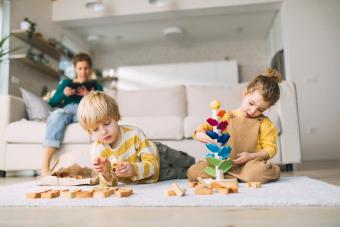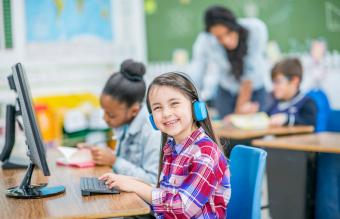
Montessori activities, otherwise known as child-led activities, are a great way to help your child master life skills, become more self-sufficient, and find a love for learning.
While Montessori schools are a fantastic choice, they're not available everywhere. Parents might also want to implement Montessori ideas to complement what their child does in the classroom. Thankfully, there are easy ways to implement Montessori activities at home and help your child grow!
What Is the Montessori Method?
Maria Montessori was a pioneer in the field of education. According to her research, the best way to teach a child was to let them be in control. The Montessori method takes a hands-on approach to learning and focuses on developing practical, real-world skills.
Educators guide learning opportunities, but allow the children to engage at their own pace. Most the activities also involve some sort of sensory stimulation, which has been proven to bolster cognitive development.
A Montessori education has been shown to hone a child's focus, provide opportunities for creativity, and promote independence. It has also been proven to help children gain academic success, and it brings long-term improvements in a child's well-being into adulthood.
Top Montessori Activities to Help Your Toddler Learn

Montessori activities are designed to fine tune your child's fine and gross motor skills, teach them to complete real-life tasks, and foster a love for learning. Here are some great Montessori ideas to try.
Color Sorting
Learning colors is an important concept that's required for your child to enter kindergarten. Color sorting activities can help your kids learn the different shades while also improving their fine motor skills and facilitating language development. Parents can start small by simply having their child spend time finding red or blue objects around the house.
Once your child knows their different colors, try making their activities more challenging by mixing objects of different colors together and having them sort them into corresponding colored bags or bins. You can continue to build on these activities to fine tune these skills and give them more to learn.
Building
Blocks, magna tiles, Lincoln logs, and other building toys are great Montessori activities that further improve a child's dexterity and allow them to use their imagination. These pursuits also teach spatial awareness, enhance hand-eye coordination, and bolster a child's focus.
Building on tile or hardwood can be frustrating because these surfaces can be slippery. Stability is key when it comes to keeping your toddler focused on this Montessori activity. Try playing with blocks on a carpeted area, rug, or play mat, or invest in a building block base or table to help their creations stay upright.
Molding

Play Doh and clay are great sensory activities that promote creativity and stimulate the senses, which can have a wonderful calming effect on kids. We recommend pairing these molding materials with cookie cutters, rolling pins, stamps, and plastic pastry crimpers to make this creative play even more fun.
For kids who need a little extra guidance, you can buy printable Play Doh mats. These help your kids to see the different shapes they need to form and colors they need to choose in order to mold a particular object.
Puzzles
Puzzles are another excellent Montessori activity that improve memory, teach spatial reasoning, and build problem-solving skills. When searching for options, look for wooden puzzles that incorporate multiple concepts. These can include:
- Shapes
- Numbers
- Letters
- Time Telling
- Animals
- Spelling
Toddlers tend to do best with peg puzzles and puzzles that have the shape of each item cutout. Once they master these, you can move on to more challenging options.
Sensory Bin Play
Sensory bins are a great space for toddlers to engage in Montessori activities like pouring, scooping, sorting, and measuring. These activities also have an amazing calming effect on kids making them a win-win for parents.
Flashcard Matching
Just having your child memorize items is not a Montessori activity. However, when you combine flashcards with tangible items that match the images on the cards, you suddenly have a wonderful learning opportunity!
For instance, if you are helping your child to learn the names of different animals, grab a bin of plastic animal toys and have them match the toy with the corresponding animal in the card.
Musical Fun
The Montessori approach to music requires a child to engage all of their senses - "the ear, the eye, the voice, the hand, the body, and the soul of the child." This means not just playing music, but utilizing movement, musical instruments, and their voices!
Most kids know the songs "Head, Shoulders, Knees, and Toes" and "Put Your Right Hand In." These are marvelous options to help facilitate a sensory experience.
Montessori Practical Life Activities

As mentioned, part of Montessori education is teaching self-sufficiency. The best way to do that is to have them engage is household and self-care tasks! Here are some easy activities to try.
Chores
When your kids attend Montessori school, part of play is putting things away! This can easily be implemented at home by having your kids help with simple tasks and chores like:
- Wiping up messes after meals
- Making their bed
- Putting away their toys
- Sweeping the floor
- Feeding their pets (scooping the food, counting the number of scoops, and getting the pets to sit before eating)
- Throwing trash away
- Setting the table
- Rinsing and washing dishes
Parents can help their children become self-reliant by giving them access to their cups, plates, towels, and other daily essentials. These can be stored in low cabinets or shelving that they can reach. This gives them the opportunity to take the initiative to set the table or clean up messes without having to be asked. When you make it a part of their daily routine, it will become second nature to them.
Gardening
Working with your hands is extremely thereputic, no matter what your age may be. Gardening is another excellent method for teaching your kids independence and responsibility. Digging, scooping, and pouring are all simple Montessori activities that can be done in the garden. This is also a wonderful way to get your kids excited about their food.
Kitchen Basics

Washing their fruit, cutting their vegetables, peeling hard-boiled eggs, kneading dough, and measuring ingredients are all necessary life skills. They also help your child develop fine and gross motor skills, learn basic math concepts, and build excitement around healthy eating. Parents should look at getting a step stool as well as a toddler-safe knife, both to be used under adult supervision, to complete these types of activities.
While cooking, have them practice other practical life skills like opening and closing containers, transferring food with tongs and a spoon, and carrying a full plate or cup. These all seem like simple tasks, but you have to remember that they are all new to your child.
Getting Dressed
How do you put on a shirt? This is another activity that is second nature to you and I, but to your toddler it can be a confusing task. One of the best ways to teach skills like how to get dressed or tie a shoe is to let them practice with their toys. Dolls and Build A Bear animals are a good place to start.
Then, they can work on clothing themselves. Dress up games are always a fantastic option as well. Parents can buy a mini coat rack stand or install hooks in the wall at your child's eye level and hang up costume pieces. Let them dress up like a chef, a fireman, a doctor, or a construction worker!
Busy boards with have buttons, snaps, and clips can also help your kids get practice completing these common life skills.
Self Care
Other life skills to teach your toddler include brushing their teeth, combing their hair, and washing their hands.
Balance & Spatial Awareness
Climbing, jumping, crawling, leaping, and running are all functional body movements that require practice to hone. Whether you invest in Montessori climbing toys or simply head to the playground, these activities give your child the chance to explore their environment and find their center. This helps with gross motor development, balance building, and engaging in these actions can decrease stress and anxiety.
Many gymnastics facilities offer classes and even day passes that can allow your kids to get a similar experience.
Montessori Activities Can Give Your Child a Sense of Accomplishment
Being able to conduct "big kid" tasks is a big step for a toddler. Building independence and teaching your child to think creatively are amazing ways to establish a solid foundation for their academic future. Montessori activities are a wonderful tool for making this happen!







